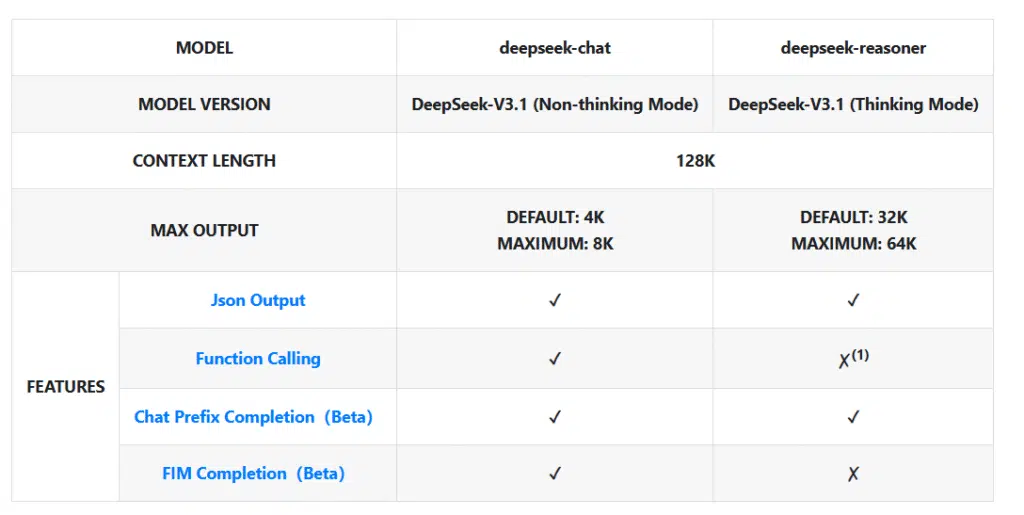If you are thinking about investing in the newly launched AI model DeepSeek, you must know its pricing details and whether it provides good value for money.
However, DeepSeek doesn’t follow the regular subscription structure. You are charged according to your token usage, which can be a little confusing if you aren’t familiar with the tool.
Plus, due to the buzz around DeepSeek, a lot of incorrect information about it is scattered around the internet. It can be difficult to understand how much you will have to spend to get the right DeepSeek plan for yourself.
In today’s article, I will break down the technicalities of DeepSeek pricing, including:
- The pricing tiers.
- The input and output capacity you get with each.
This will help you decide whether DeepSeek is the most cost-effective AI chat assistant for your needs. And in case it doesn’t fit your budget or requirements, I have another excellent AI solution for you as well.
Table of contents
DeepSeek Pricing Plans
DeepSeek has disrupted the AI space with its open-source and cheaper alternative to ChatGPT. The pricing is based on token usage, with expenses calculated by multiplying the number of tokens by the respective price.
Before we dive into the pricing, let me help you understand what tokens are and how they are calculated:
DeepSeek uses tokens as the basic unit for its model to represent natural language text. They calculate billing on how many tokens you have used.
According to DeepSeek’s website, “a Chinese word, an English word, a number, or a symbol is counted as a token.”
The conversion ratio of tokens and the number of characters are like this:
- 1 English character = 0.3 token.
- 1 Chinese character = 0.6 token.
➡️ The official pricing page and API docs now show the up-to-date token prices and the new pricing schedule (standard + off-peak discounts, and an announced change taking effect Sept 5, 2025).
Does DeepSeek Offer Free Tools?
DeepSeek-V3 offers a free demo that you can access instantly through your web browser.
You can also download and run it locally for commercial use, as DeepSeek provides an open-source implementation. The source code is available on GitHub.
Other than that, DeepSeek publishes per-1M-token rates for its models (input: cache-hit / cache-miss; output).
The official API pricing table lists the current standard and discounted (off-peak) rates for deepseek-chat and deepseek-reasoner.
Because DeepSeek has scheduled pricing updates tied to model releases, use the official pricing page for the precise numeric table and timestamps rather than a static copy in this article.
DeepSeek’s tokenization and the token → character conversion can vary by model and by text language; the company provides guidance, but those ratios are approximate. Also, earlier discount rules (including model exclusions) applied during specific promo windows in early 2025; those rules are historical.
DeepSeek published a pricing update tied to the V3.1 release and scheduled a new price list to take effect in early September 2025, so refer to the official pricing page for up-to-date details and any model exclusions.
DeepSeek Chat
The deepseek-chat model is the lower-cost option for general chat use. DeepSeek’s V3.x documentation now lists a 128K context length for recent V3.1 builds (context and max output can vary by model version and by API offering).

Chain-of-Thought allowances and max output tokens differ by model and version: consult the model-specific docs for the exact limits you’ll be billed for.

➡️ I previously observed discounted rates in early 2025, but those promotional prices are no longer the canonical reference: note that DeepSeek’s official API pricing tables are the authoritative source for current per-1M-token rates.
Historical promotional windows (e.g., early-February 2025) have ended; DeepSeek’s current and future pricing windows are published on its API docs and release notes: check those pages for exact effective dates before budgeting.
Here are the features you get with the DeepSeek Chat model:
- Access on Windows, Android, and iOS devices.
- “DeepThink” mode for step-by-step reasoning for complex queries (only for the DeepSeek-R1 model).
- Chat features like ChatGPT.
DeepSeek Reasoner
The DeepSeek Reasoner model stood out to me for its advanced reasoning capabilities. The pricing here is also based on how many tokens you use, including all tokens from the CoT process and the final answer.

While the context length and max output token are the same in both models, DeepSeek Reasoner has a maximum CoT token number of 32K.

The official DeepSeek documentation lists per-1M-token input (cache-hit / cache-miss) and output rates for the reasoner model; those numbers have been adjusted in 2025, and DeepSeek announced a new consolidated price schedule to take effect in early September 2025.
DeepSeek Reasoner offers the following features:
- Multi-round Conversation.
- Generates multiple Chains of Thought, enhancing the accuracy of its responses.
Want a More Versatile Alternative to DeepSeek?
While DeepSeek costs lower in comparison to ChatGPT, it’s still riddled with several problems.
First of all, there is a huge security concern, especially if your business deals with sensitive internal and customer data. Since the systems learn through user inputs, there is a risk of data leakage.
Plus, it’s an open-source system, so anyone can use it for their own tools. That means that developers can add elements that save your information for later modeling.
Such issues hint at compliance issues outside China and can potentially land you in expensive legal trouble.
Users also often complain about the results being inaccurate and inconsistent. The outputs are sometimes biased, so you won’t get the complete picture in the results.
For example, X user Cyrus John uploaded two screenshots that show how DeepSeek often produces results that sound more like Chinese propaganda than hard facts.
You may have to fact-check certain information before using them, which requires extra time.
Plus, if you want a tool for your team, there are other DeepSeek alternatives. For example, our solution, Team-GPT offers another accurate, and cost-effective AI tool. Here, You can:
- Customize it according to your company’s needs.
- Drive holistic adoption throughout the organization since it’s very easy to use.
Here are some Team-GPT features that can meet your needs efficiently:
Team-GPT Features
No company can grow without an efficient team. That’s why Team-GPT is built with seamless collaboration in mind.
From agility to customizability, our AI solution offers everything your team needs from an efficient AI-driven workspace.
Here are the features Team-GPT offers:
Feature #1. Switch between different AI models with unlimited usage
Team‑GPT gives marketing teams full control over how they work with AI.
Your team can integrate multiple top-tier models (GPT-4o, Claude, Gemini, Mistral, or even your own via API), allowing you to choose the right model for each task.
Moreover, structured prompt templates ensure consistent messaging across use cases, whether for SEO, ads, email, or product pages.
Shared libraries and reusable tone instructions also help maintain voice across campaigns, keeping everyone aligned and on-brand without duplicating effort.
Feature #2. Pre-Built Mini Marketing Tools
Team-GPT helps your marketing team get started right away with 5 pre-built marketing mini tools:
- A social media post generator, where you can put your content idea, goal, tone, audience, and platform.
- A marketing plan generator, where you can input your campaign details, target audience, campaign goals, and campaign timeline.
- A landing page analyzer that will crawl the page and analyze its content using AI, including a clarity score, jargon, logic flow, and audience fit.
- SEO text optimizer that lets you put your content and then set the SEO parameters, such as the main keyword, secondary keywords, and search intent.
- AI hummanizer that will take your AI text and hummanize it so you won’t get caught in AI detectors.
Feature #3. Build Your Best Prompts With The Prompt Builder
The way our prompt builder works is that you have to begin by describing your task, such as ‘‘I want to humanize AI content.’’
After that, our prompt builder will ask you to answer a few follow-up questions about the content that you want to humanize.
For me, these questions were:
- Who is the target audience for this AI-generated content you want to humanize? (e.g., general public, specific industry, experts)
- What tone and style do you want to achieve in the humanized content? (e.g., friendly, professional, humorous, persuasive)
- What kind of AI-generated content are you working with? (e.g., blog post, email, code, report)
As a final output, Team-GPT generated a prompt to use to humanize my content, which provides information about the persona, context, and task:
Learn more about how you can use our prompt builder by watching this guide on it: How to use the Prompt builder | Team-GPT
Feature #4. Enterprise-Grade Security & Control
Whether you’re a regulated company or a privacy-conscious agency, Team‑GPT supports enterprise-class security, including:
- Private cloud or on-premise hosting.
- Role-based access, workspace isolation, and SSO.
- Full SOC2, ISO27001, and GDPR compliance.
With custom deployment options and audit trails, it’s ready for teams that handle sensitive content or client data.
Feature #5. Shared Project Knowledge for On-Brand AI Output
You can upload brand guidelines, campaign briefs, customer personas, and competitor research into a shared knowledge base per project. The AI references this automatically, keeping your outputs consistent.
Each team member can:
- Add and update project knowledge.
- Link documents, assets, and brand voice guidelines.
- Use pre-set instructions to steer tone, structure, and messaging.
This is especially useful for marketing agencies managing multiple brands or in-house teams launching multi-channel marketing campaigns.
| P.S. Watch this video to learn how you can write articles in just 3 minutes inside of Team-GPT while collaborating with your team. |
Team-GPT Pricing
Team-GPT comes with a free plan that lets you invite up to 5 team members and chat with Gemini 2.5 Pro, and generate images with DALL-E 3.
You’ll also get access to unlimited projects, chats, and pages with your team, and be able to get access to the prompt builder, text humanizer, and the other marketing mini tools.
Team-GPT offers three paid plans tailored for growing marketing teams:
- Business Plan: $25 per user per month (billed annually, minimum 5 users). Includes:
- Multi-model access (GPT-4, Claude, Gemini, etc.)
- Shared workspace and folder structure.
- Prompt templates and usage tracking.
- In-chat image generation.
- Support and onboarding resources.
- Growth Plan: $35 per user per month (billed annually). Adds:
- Unlimited model usage.
- BYO API keys (for cost control).
- Access to Gemini, DeepSeek, and Perplexity.
- Advanced analytics and dashboards.
- Workflow integrations and prompt packs.
- Premium onboarding.
- Enterprise Plan: Custom pricing (150+ users). Includes everything in Growth plus:
- Private/on-prem deployment.
- Custom model integrations.
- Dedicated support.
- Admin and audit tools.
- Unlimited workspaces.
Improve Data Security and Collaboration With Team-GPT
While DeepSeek is getting a lot of traction at the moment, its drawbacks are too big to ignore. So, choose Team-GPT if you want to:
- Leverage multiple AI systems in a single platform without draining your budget.
- Foster better teamwork with collaborative AI chat space.
- Align the AI solution perfectly with your unique business needs.
- Facilitate company-wide adoption.
- Guarantee data security and compliance.
Book a demo today and let our AI experts show you how Team-GPT can improve your team’s productivity with our all-in-one AI platform.
Read More:
- Claude Pricing: Explore our comprehensive assessment of Claude’s pricing plans.
- Perplexity Pricing: Check our review on how much Perplexity charges and what each plan offers.
- Microsoft Copilot Pricing: See our simple review of Microsoft Copilot’s cost to decide if it suits your needs.
- Gemini Pricing: Learn all about Gemini’s subscription plans and their associated features.
- ChatGPT pricing: Here is our detailed review of ChatGPT’s pricing plan.
- Microsoft Copilot Alternatives: We bring you 10 alternatives you can choose from instead of Microsoft Copilot.
- Best Copysmith Alternatives: Want to find the perfect Copysmith alternative? Here are 7 options worth considering.
- Best Copy.AI alternatives: Explore our review of the top 7 Copy.AI competitors.
- Writesonic Alternatives: Here are the 8 best Writersonic alternatives you can look into.
- Jasper Alternatives: Compare 7 best Jasper alternatives to choose the best one for your needs.
- ChatGpt Alternatives: Find out which ChatGPT alternative is perfect for you from the top 10 options.

Iliya Valchanov
Iliya teaches 1.4M students on the topics of AI, data science, and machine learning. He is a serial entrepreneur, who has co-founded Team-GPT, 3veta, and 365 Data Science. Iliya’s latest project, Team-GPT is helping companies like Maersk, EY, Charles Schwab, Johns Hopkins University, Yale University, Columbia University adopt AI in the most private and secure way.


